新概念英语第二册笔记-第48课
新概念第二册课文翻译及学习笔记【Lesson46、47、48】
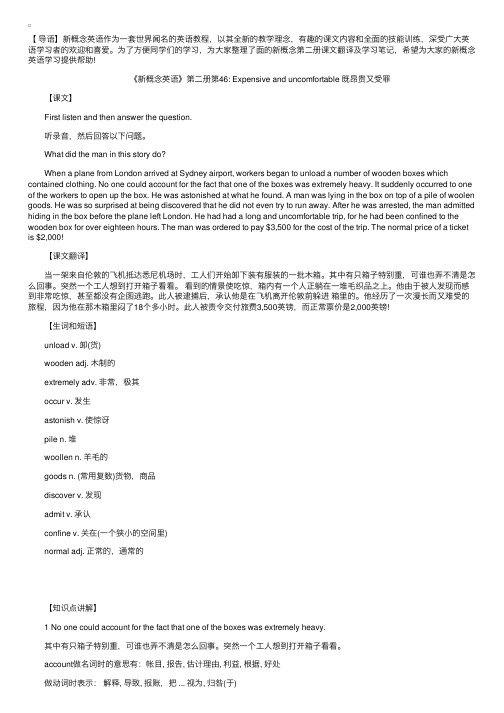
【导语】新概念英语作为⼀套世界闻名的英语教程,以其全新的教学理念,有趣的课⽂内容和全⾯的技能训练,深受⼴⼤英语学习者的欢迎和喜爱。
为了⽅便同学们的学习,为⼤家整理了⾯的新概念第⼆册课⽂翻译及学习笔记,希望为⼤家的新概念英语学习提供帮助!《新概念英语》第⼆册第46: Expensive and uncomfortable 既昂贵⼜受罪【课⽂】First listen and then answer the question.听录⾳,然后回答以下问题。
What did the man in this story do?When a plane from London arrived at Sydney airport, workers began to unload a number of wooden boxes which contained clothing. No one could account for the fact that one of the boxes was extremely heavy. It suddenly occurred to one of the workers to open up the box. He was astonished at what he found. A man was lying in the box on top of a pile of woolen goods. He was so surprised at being discovered that he did not even try to run away. After he was arrested, the man admitted hiding in the box before the plane left London. He had had a long and uncomfortable trip, for he had been confined to the wooden box for over eighteen hours. The man was ordered to pay $3,500 for the cost of the trip. The normal price of a ticket is $2,000!【课⽂翻译】当⼀架来⾃伦敦的飞机抵达悉尼机场时,⼯⼈们开始卸下装有服装的⼀批⽊箱。
逐句精讲新概念英语第二册第48课你想对我说什么吗?
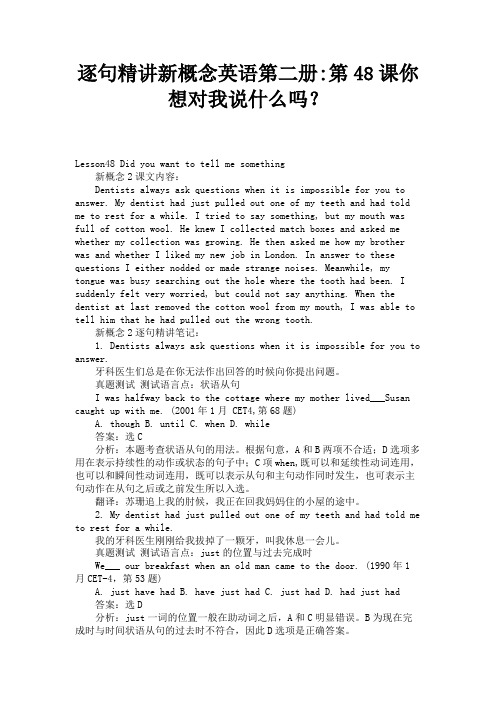
逐句精讲新概念英语第二册:第48课你想对我说什么吗?Lesson48 Did you want to tell me something新概念2课文内容:Dentists always ask questions when it is impossible for you to answer. My dentist had just pulled out one of my teeth and had told me to rest for a while. I tried to say something, but my mouth was full of cotton wool. He knew I collected match boxes and asked me whether my collection was growing. He then asked me how my brother was and whether I liked my new job in London. In answer to these questions I either nodded or made strange noises. Meanwhile, my tongue was busy searching out the hole where the tooth had been. I suddenly felt very worried, but could not say anything. When the dentist at last removed the cotton wool from my mouth, I was able to tell him that he had pulled out the wrong tooth.新概念2逐句精讲笔记:1. Dentists always ask questions when it is impossible for you to answer.牙科医生们总是在你无法作出回答的时候向你提出问题。
新概念英语二lesson48笔记
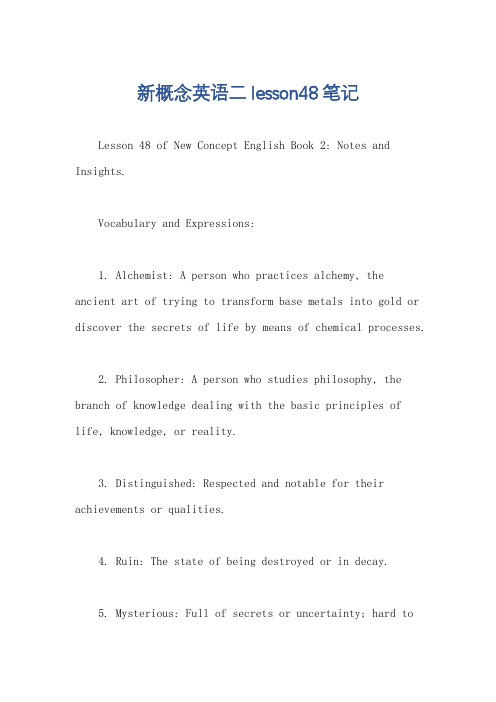
新概念英语二lesson48笔记Lesson 48 of New Concept English Book 2: Notes and Insights.Vocabulary and Expressions:1. Alchemist: A person who practices alchemy, the ancient art of trying to transform base metals into gold or discover the secrets of life by means of chemical processes.2. Philosopher: A person who studies philosophy, the branch of knowledge dealing with the basic principles of life, knowledge, or reality.3. Distinguished: Respected and notable for their achievements or qualities.4. Ruin: The state of being destroyed or in decay.5. Mysterious: Full of secrets or uncertainty; hard tounderstand or explain.6. Legend: A widely known story, often about someone or something supernatural, that is passed down through the ages.7. Alchemy: The ancient art or science of combining substances to achieve magical or remarkable effects, especially the transformation of base metals into gold.8. Experiment: A test or trial, especially one carried out to discover or demonstrate something new or unknown.9. Potion: A liquid medicine or drink, often magical or mysterious in nature.10. Elixir: A supposed medicine or potion, especially one believed to have the power to prolong life indefinitely.Grammar and Sentence Structure:This lesson presents a variety of sentence structures,including compound sentences, complex sentences, and declarative, interrogative, and imperative moods. For instance, the sentence "The alchemist discovered the secret of making gold, and the king was so pleased that he gave him a high position in the government." demonstrates a compound sentence with a coordinating conjunction ("and") connecting two independent clauses.The sentence "One day, the king sent for the alchemist, and said to him, 'I have heard that you can make gold. Isit true?'" illustrates a complex sentence with a relative clause ("the king sent for the alchemist") and a direct speech reported by the verb "said".Insights and Lessons Learned:The story of the alchemist and the king teaches us several valuable lessons about human nature and the quest for knowledge. Firstly, it highlights the importance of perseverance and dedication to one's craft, as the alchemist spent years experimenting and refining his methods before achieving success. Secondly, it underscoresthe dangers of greed and the pursuit of material wealth, as the king's obsession with gold led him to squander his resources and ultimately his kingdom.Moreover, the story reminds us of the importance of critical thinking and skepticism. The king's unquestioning belief in the alchemist's claims led him to make foolish decisions, whereas a more skeptical approach might have revealed the truth sooner. Finally, the story teaches us about the value of wisdom and the importance of distinguishing between appearance and reality. The alchemist, with his knowledge and understanding, was able to see through the king's folly and escape with his life and his secret.In conclusion, Lesson 48 of New Concept English Book 2 is not just a story about alchemy and kings, but a profound lesson about human nature, knowledge, and the consequences of our actions. It encourages us to be diligent, skeptical, and wise in our pursuits, and to remember that true value lies not in material wealth, but in the knowledge and wisdom we gain through our lives.。
裕兴新概念英语第二册笔记_第48课_单词讲解

Lesson 48Did you want to tell me something?你想对我说什么吗?7-17-2014 New words and expressionspull v拔cotton wool 药棉collect v搜集collection n收藏品,收集品nod v点头meanwhile adv同时pull [pul]1v拔(草,瓶塞,钉子等),拔掉,拉开eg I spent a whole day pulling weeds. 我花了一整天时间拔杂草。
pull out a nail拔出钉子pull out a stopper拔出塞子。
have the decayed tooth pulled out 请(牙医)拔掉蛀牙decayed [dɪ’keɪd]烂了的;腐败的pull out the wrong tooth拔错了牙This kind of carrot won’t pull easily. 这种胡萝卜不容易拔。
carrot ['kærət] n胡萝卜2v拖,扯,拉eg If you want sth , pull this cord. 要是你需要什么,就拉这根绳子。
pull vt拔,拉 ←→push vt.推drag硬拉haul [hɔ:l]拖拉tug用力拉stretch [stretʃ]硬拉长tow [təu]用绳子、链子拖引pull up(使车辆)停下来eg She didn’t pull her car up at the red light. 在红灯处,她没有停车。
pull on穿上,戴上 ←→pull offpullover ['pʊl,əʊvə]套头毛衣,套头棉衫pull one's leg开某人玩笑eg You are pulling my leg.你在开我玩笑eg Don't pull my leg any more.不要再开我玩笑cotton wool药棉cotton ['kɔtən]1n[U]棉花,脱脂棉raw cotton原棉raw [rɔ:] adj生的,未煮过的;天然的;未加工过的;a cotton field棉田grow cotton种棉花2adj棉的,棉制的cotton goodscotton cloth棉布cotton industry棉纺织行业美国的棉花生产高居世界第一位,其生产地在南部 14个州的产棉地带称为:Cotton Beltcollect [kə'lekt]1v收集,搜集,(人)集合eg He collected foreign coins.他收集外国硬币。
新概念英语第二册 lessonLesson 48 Did you want to tell me something

questions?
In answer to these questions the writer either nodded or made strange noises.
Lesson 48 Did you want to tell me something?
Everyday English
• Miracles ([‘mɪrək(ə)l]奇迹) sometimes occur, but one has to work terribly for them. ——Weizmann
nod [nɒd]
v. 点头
meanwhile ['miːnwaɪl] adv. 同时
dentist [‘dentɪst]
n.牙医
tongue [tʌŋ]
n.舌头
pull • ① vt.&vi. 拉,拖,牵,扯(反义词push vt. 推) • I felt someone pulling my arm.我感觉有人拉着我的胳膊。 • I spent a whole day pulling weeds.我花了一整天拔杂草。
• ★collect v. 搜集
• collect salary
领工资
• collect stamps集邮ຫໍສະໝຸດ • collect money
筹集资金
• collect children
收养孩子
nod v. 点头 • ① vt.&vi. 点头,点头示意/招呼 • 我问他是否想来,他点了点他头。 • I asked him if he wanted to come and he nodded his head. • 当我们在办公室见面的时候,他总是向我点头 • When we meet each other in the office, he always nods at me. • ② vi. 打盹,打瞌睡(常与off连用) • 他过去在法语课上常打瞌睡 • He used to nod off during the French class. • 因为他很累,所以他一边看书一边打盹。 • As he was very tired, he nodded off over his reading. • Homer sometimes nods.智者千虑,必有一失。
裕兴新概念英语第二册笔记 第48课
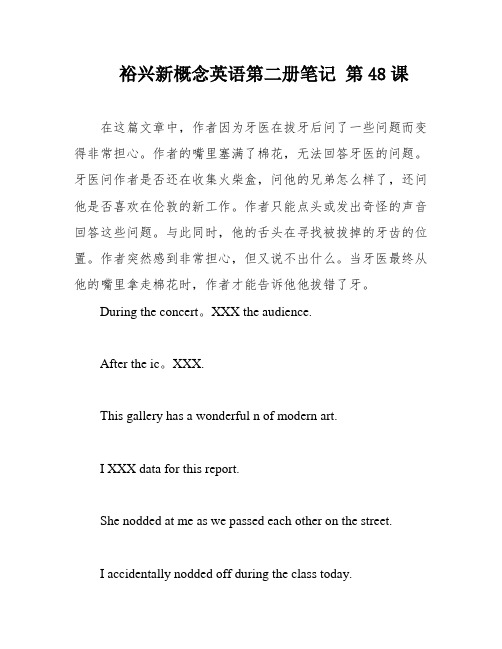
裕兴新概念英语第二册笔记第48课在这篇文章中,作者因为牙医在拔牙后问了一些问题而变得非常担心。
作者的嘴里塞满了棉花,无法回答牙医的问题。
牙医问作者是否还在收集火柴盒,问他的兄弟怎么样了,还问他是否喜欢在伦敦的新工作。
作者只能点头或发出奇怪的声音回答这些问题。
与此同时,他的舌头在寻找被拔掉的牙齿的位置。
作者突然感到非常担心,但又说不出什么。
当牙医最终从他的嘴里拿走棉花时,作者才能告诉他他拔错了牙。
During the concert。
XXX the audience.After the ic。
XXX.This gallery has a wonderful n of modern art.I XXX data for this report.She nodded at me as we passed each other on the street.I accidentally nodded off during the class today.Meanwhile。
XXX.In the meantime。
we can work on other projects.10.Ships continuously cross the sea.XXX.11."Did you take that book from the shelf?"。
XXX.He suddenly remarked。
"Did you take that book from the shelf?"12.XXX XXX.XXX bank was robbed.Such trouble XXX.She looked so beautiful in her new dress.It's such a nice day that we should go for a ic.I am so tired after working all day.1.He had no sooner come home than they rang him up fromthe office.2.XXX off than it returned to the airport.1.He has made progress.2.You never do a job properly.3.Why can't you make up your mind?4.I have to go out now。
新概念英语第二册48课讲解及课后答案
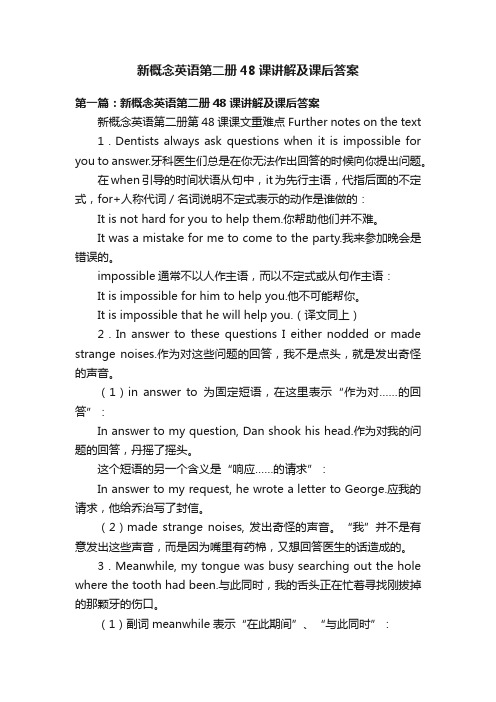
新概念英语第二册48课讲解及课后答案第一篇:新概念英语第二册48课讲解及课后答案新概念英语第二册第48课课文重难点 Further notes on the text 1.Dentists always ask questions when it is impossible for you to answer.牙科医生们总是在你无法作出回答的时候向你提出问题。
在when引导的时间状语从句中,it为先行主语,代指后面的不定式,for+人称代词/名词说明不定式表示的动作是谁做的:It is not hard for you to help them.你帮助他们并不难。
It was a mistake for me to come to the party.我来参加晚会是错误的。
impossible通常不以人作主语,而以不定式或从句作主语:It is impossible for him to help you.他不可能帮你。
It is impossible that he will help you.(译文同上)2.In answer to these questions I either nodded or made strange noises.作为对这些问题的回答,我不是点头,就是发出奇怪的声音。
(1)in answer to为固定短语,在这里表示“作为对……的回答”:In answer to my question, Dan shook his head.作为对我的问题的回答,丹摇了摇头。
这个短语的另一个含义是“响应……的请求”:In answer to my request, he wrote a letter to George.应我的请求,他给乔治写了封信。
(2)made strange noises, 发出奇怪的声音。
“我”并不是有意发出这些声音,而是因为嘴里有药棉,又想回答医生的话造成的。
新概念英语第二册Lesson46~48学习笔记
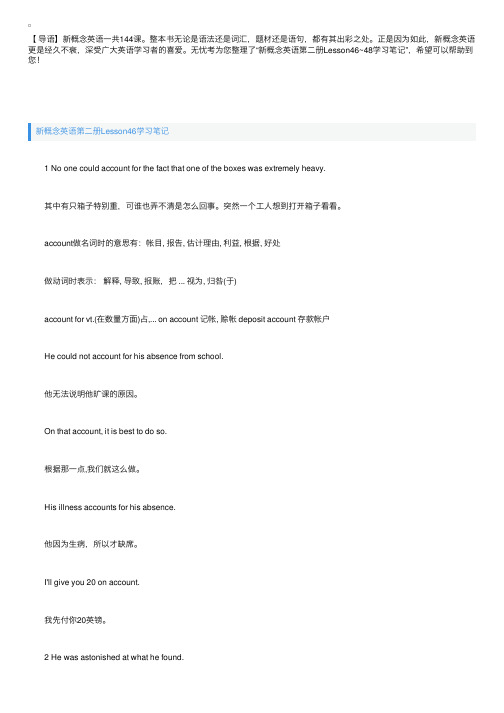
【导语】新概念英语⼀共144课。
整本书⽆论是语法还是词汇,题材还是语句,都有其出彩之处。
正是因为如此,新概念英语更是经久不衰,深受⼴⼤英语学习者的喜爱。
⽆忧考为您整理了“新概念英语第⼆册Lesson46~48学习笔记”,希望可以帮助到您!新概念英语第⼆册Lesson46学习笔记 1 No one could account for the fact that one of the boxes was extremely heavy. 其中有只箱⼦特别重,可谁也弄不清是怎么回事。
突然⼀个⼯⼈想到打开箱⼦看看。
account做名词时的意思有:帐⽬, 报告, 估计理由, 利益, 根据, 好处 做动词时表⽰:解释, 导致, 报账,把 ... 视为, 归咎(于) account for vt.(在数量⽅⾯)占,... on account 记帐, 赊帐 deposit account 存款帐户 He could not account for his absence from school. 他⽆法说明他旷课的原因。
On that account, it is best to do so. 根据那⼀点,我们就这么做。
His illness accounts for his absence. 他因为⽣病,所以才缺席。
I'll give you 20 on account. 我先付你20英镑。
2 He was astonished at what he found. 他由于被⼈发现⽽感到⾮常吃惊。
astonish,动词:使惊讶, 使吃惊,常⽤搭配是be astonished at…… I was astonished at the news of his escape. 听到他逃之夭夭的消息,我感到惊讶。
其它常和at搭配的动词还有:amuse, arrive(or in), astonish(ed)(or by),exclaim, glance, guess, knock look, point(or to), shock(ed)(or by), stare, surprise(d)(or by), wonder(or about),work(or on) 对...感到有趣,到达,感到惊愕,惊叫,对...看⼀眼,猜测,敲,看,指向,感到震惊,盯着...看,感到惊讶,感到惊异,钻研 3 语法:⼀个句⼦跟在⼀个名词后,可以是:定语从句或同位语从句 (1)同位语从句后的that是起解释说明的作⽤⽽定语从句是起修饰的作⽤ (2)that在从句中做主语或宾语成分,则是定语从句 that在从句中不能做主语或宾语成分,则是同位语从句 No one could account for the fact that one of the boxes was extremely heavy. 这句话中that引导的是同位语从句。
新概念英语第二册 lessonLesson 48 Did you want to tell me something

• It is+adj+that +句子 • It is necessary that we start earlier. • 我们早点出发是非常有必要的。 • 对他来说帮助你是不可能的。(用两种表达方式来翻译) • It is impossible for him to help you. • =It is impossible that he will help you. • 如果形容词能够修饰后面的人的性格特征就用of。 • 你帮助我这么多,你真是太好了。 • It is very kind of you to help me so much.
nod [nɒd]
v. 点头
meanwhile ['miːnwaɪl] adv. 同时
dentist [‘dentɪst]
n.牙医
tongue [tʌŋ]
n.舌头
pull • ① vt.&vi. 拉,拖,牵,扯(反义词push vt. 推) • I felt someone pulling my arm.我感觉有人拉着我的胳膊。 • I spent a whole day pulling weeds.我花了一整天拔杂草。
Dentists always ask questions when it is impossible for you to •ansQw2e:Wr. hat did the writer do in answer to the dentist’s
questions?
In answer to these questions the writer either nodded or made strange noises.
were some who were unhurt. • 在事故中,许多人丧失了,但另一方面有些人没有受伤。
新概念英语第二册(英音新版)第48课:你想对我说什么吗?

Lesson 48 Did you want to tell me something?第四⼗⼋课你想对我说什么吗?First listen and then answer the question.听录⾳,然后回答以下问题。
Why did the writer become very worried?为什么作者编的很担忧?Dentists always ask questions when it is impossible for you to answer.⽛科医⽣们总是在你⽆法作出回答的时候向你提出问题。
My dentist had just pulled out one of my teeth and had told me to rest for a while.我的⽛科医⽣刚刚给我拔掉了⼀颗⽛,叫我休息⼀会⼉。
I tried to say something, but my mouth was full of cotton wool.我想说点什么,但我嘴⾥塞满了药棉。
He knew I collected match boxes and asked me whether my collection was growing.他知道我收集⽕柴盒,于是问我收藏的⽶柴盒是否在增加。
He then asked me how my brother was and whether I liked my new job in London.接着他⼜问我的兄弟近来如何,问我是否喜欢伦敦的新⼯作。
In answer to these questions I either nodded or made strange noises.作为对这些问题的回答,我不是点头,就是发出奇怪的声⾳。
Meanwhile, my tongue was busy searching out the hole where the tooth had been.与此同时,我的⾆头正在忙着寻找刚拔掉的那颗⽛的伤⼝。
新概念英语第二册Lesson48 Did You Want to Tell Me Something

Exercise
根据句意和汉语提示用适当形式填空 1.The wallet I was _s_e_a_r_ch_i_n_g_ for was in my pocket all the time. (寻找) 2. Give me a moment to _c_o_ll_ec_t__ my notes together.(搜集) 3. The teacher wrote on the blackboard __w_h_i_le__ the students took notes.(同时) 4. I can’t ___p_u_t__up with the noise outside.(忍受) 5. He was __re_m__ov_e_d__ from his position as chairman.(移走) 6. Please __m_a_k_e_up your mind what you want. I can’t wait all day!
Keys
1. The dentist in the store had pulled out one of the writer's teeth and had told him to rest for a while.
2. He asked several questions but the writer couldn't answer them.
Recite the lesson
1 Dentists - ask - impossible - to answer 2 My dentist - pulled out - told me - rest 3 tried to say - mouth full - cotton wool 4 asked - collection of - eggs - growing 5 then - my brother - new job - London 6 In answer - nodded - strange noises 7 t been 8 suddenly - worried - couldn't say 9 When - dentist at last - from my mouth - able to
新概念第二册Lesson 48 Ddi you want to tell me something

新概念第二册Lesson 48 Ddi you want to tell me something?一、单词精讲pull v. 拔(1)拉,拖,牵,扯:I felt someone pulling my arm.我觉得有人在拉我的胳膊。
They pulled the heavy bag into a room.他们把那个重袋子拖到一个房间里。
You have to pull hard.你得用力拉。
(2)拔,抽:You've pulled out the wrong teeth!你拔错了牙!He pulled an address book from his pocket.他从口袋里抽出一本通讯录。
cotton wool 药棉collect v. 搜集词汇链接:collection n. 收藏品, 收集品固定搭配及常见用法:① collect salary 领工资① collect money 筹集资金① collect stamp 集邮① collect children 收养孩子collection n. 收藏品,收集品nod v. 点头(1)vt.,vi. 点头,点头示意/招呼:I asked him if he wanted to come and he nodded his head.我问他是否想来,他点了点头。
When we meet each other in the office, he always nods at me.我们在办公室见面时,他总是向我点头打招呼。
(2)vi. 打盹,打瞌睡(常与off连用):He used to nod off during the French class.他过去常在上法语课时打瞌睡。
As he was very tired, he nodded over his reading.因为他很累,所以他一边看书一边打盹。
meanwhile adv. 同时meanwhile = at the same time = in the same time用法和however 一样,不能连接两个句子,但是意思上有承接概念。
新概念英语第二册48课讲解与课后答案

新概念英语第二册第48课课文重难点Further notes on the text1.Dentists always ask questions when it is impossible for you to answer. 牙科医生们总是在你无法作出回答的时候向你提出问题。
在when引导的时间状语从句中,it为先行主语,代指后面的不定式,for+人称代词/名词说明不定式表示的动作是谁做的:It is not hard for you to help them. 你帮助他们并不难。
It was a mistake for me to come to the party. 我来参加晚会是错误的。
impossible通常不以人作主语,而以不定式或从句作主语:It is impossible for him to help you. 他不可能帮你。
It is impossible that he will help you. (译文同上)2.In answer to these questions I either nodded or made strange noises. 作为对这些问题的回答,我不是点头,就是发出奇怪的声音。
(1)in answer to为固定短语,在这里表示"作为对……的回答":In answer to my question, Dan shook his head. 作为对我的问题的回答,丹摇了摇头。
这个短语的另一个含义是"响应……的请求":In answer to my request, he wrote a letter to George. 应我的请求,他给乔治写了封信。
(2)made strange noises, 发出奇怪的声音。
"我"并不是有意发出这些声音,而是因为嘴里有药棉,又想回答医生的话造成的。
(完整版)新概念英语第二册笔记_第48课

Lesson 48 Did you want to tell me something? 你想对我说什么吗?Why did the writer become very worried?Dentists always ask questions when it is impossible for you to answer. My dentist had just pulled out one of my teeth and had told me to rest for a while. I tried to say something, but my mouth was full of cotton wool. He knew I collected match boxes and asked me whether my collection was growing. He then asked me how my brother was and whether I liked my new job in London. In answer to these questions I either nodded or made strange noises. Meanwhile, my tongue was busy searching out the hole where the tooth had been. I suddenly felt very worried, but could not say anything. When the dentist at last removed the cotton wool from my mouth, I was able to tell him that he had pulled out the wrong tooth.参考译文牙科医生们总是在你无法作出回答的时候向你提出问题。
- 1、下载文档前请自行甄别文档内容的完整性,平台不提供额外的编辑、内容补充、找答案等附加服务。
- 2、"仅部分预览"的文档,不可在线预览部分如存在完整性等问题,可反馈申请退款(可完整预览的文档不适用该条件!)。
- 3、如文档侵犯您的权益,请联系客服反馈,我们会尽快为您处理(人工客服工作时间:9:00-18:30)。
新概念英语第二册笔记-第48课Lesson 48 Did you want to tell me something? 你想对我说什么吗?Why did the writer become very worried?Dentists always ask questions when it is impossible for you to answer. My dentist had just pulled out one of my teeth and had told me to rest for a while. I tried to say something, but my mouth was full of cotton wool. He knew I collected match boxes and asked me whether my collection was growing. He then asked me how my brother was and whether I liked my new job in London. In answer to these questions I either nodded or made strange noises. Meanwhile, my tongue was busy searching out the hole where the tooth had been. I suddenly felt very worried, but could not say anything. When the dentist at last removed the cotton wool from my mouth, I was able to tell him that he had pulled out the wrong tooth.参考译文牙科医生们总是在你无法作出回答的时候向你提出问题。
我的牙科医生刚刚给我拔掉了一颗牙,叫我休息一会儿。
我想说点什么,但我嘴里塞满了药棉。
他知道我收集火柴盒,于是问我收藏的米柴盒是否在增加。
接着他又问我的兄弟近来如何,问我是否喜欢伦敦的新工作。
作为对这些问题的回答,我不是点头,就是发出奇怪的声音。
与此同时,我的舌头正在忙着寻找刚拔掉的那颗牙的伤口。
我突然非常着急起来,但却什么也说不出来。
当那位牙医最后将药棉从我嘴中取出时,我总算有可能告诉他,他拔错了牙。
一、New words and expressions 生词和短语pull v. 拔cotton wool 药棉collect v. 搜集collection n.收藏品,收集品nod v. 点头meanwhileadv. 同时pull1) v. 拔(草,瓶塞,钉子等),拔掉,拉开例: I spent a whole day pulling weeds.我花一整天时间来拔草。
pull out a nail 拔出钉子pull out a stopper 拔出塞子have the decayed tooth pulled out请(牙医)拔掉蛀牙pull out the wrong tooth 拔错了牙eg. This kind of carrot won't pull easily.这塞种胡萝卜不容易拔。
2) v. 拖,扯,拉eg. If you want something, pull this cord. pull[pul] 拉drag硬拉haul 拖拉tug 用力拉stretch 硬拉长tow 用链子(绳)拖引pull up(使车辆)停下来例: She didn't pull her car up at a red light. pull on穿上,戴上(反义词pull off)pullover 套头毛衣,套头棉衫cotton wool药棉,脱脂棉cotton1)[u]棉花raw cotton 原棉a cotton field 棉田grow cotton 种棉花2)adj. 棉的,棉质的cotton cloth 棉布cotton goods 棉织品cotton industry棉纺织行业美国的棉花生产高居世界第一位,其生产地往南部14州地产棉地带,称为:the Cotton Beltcollect v. 搜集1) V. 收集;搜集;(人)集合eg. He collected foreign coins. 他收集外国硬币。
They collected up all the wastepaper after the picnic.在野餐之后,他们把所有的废物收集了起来A lot of people collected at the concert.演奏会上听众云集。
2)v. 征收(租税):募(捐):收(款):募集(捐款)collect for charity 慈善募捐collect taxes 征收税金collect rent from a tenant向房客收取租金collect call 由受话人付费的电话collection1) n. 收藏品,收藏物,集合(的东西)eg. This gallery has a fine collection ofmodern pictures.这家美术馆收藏一批珍贵的现代画。
a large collection of stamps -大批收藏的邮票2)n. 收集,采集,(从邮筒)取信eg. The collection of the data for this report took me a lot of time.. 这个报告的资料的收集工作花费我很长时间make a collection of rare books收藏珍藏本collector 收藏家,采集者,收款人a stamp collector 一个邮票收藏者tax collector 收税员nod1)V. 点头(nodded,nodding) (表示同意,打招呼,或示意等)shake one' s head 摇头eg. She nodded to me on the Street. 她在街上向我打招呼。
He nodded and we stoop up. 因他点头示意所以我们站起来。
2) v. 打盹例: I nodded off during the class today.今天我在课堂上打盹了。
3)V. (不留神)弄错,失误(罕见)eg. Homer sometimes nods. 智者千虑必有一失。
(谚)meanwhile/in the meantime1)期间,在此期间eg: The train won' t leave for an hour. Meanwhile we can have lunch.火车一个小时之内时不会走的,在此期间我们可以吃午饭。
2)另一个方面例: In the accident, many people were killed, but meanwhile there were some who were unhurt.在事故中,有些人丧生了,但是在另一个方面,有些人没有受伤。
二、关键句型Special difficultiesExercise选择正确的词来填空:1. The new school, which (which/who) has just been completed, is a fine building.那个刚刚建完的新学校是个不错的建筑。
2. He denied (denied/refused)that he had taken it.他否认他拿了那个东西。
3. The waiter fetched (took/fetched) me a clean glass.服务员为我拿来了一个干净的杯子。
4. He is too (too/very) ill to do any work.他病的太重了以至丁不能做任何工作。
5. I had d few jobs (works/jobs) to do in town this morning.今早我进城有些事情要办。
One (A/One) day I spoke to a man who had won the Noble Prize. .一天我和一个赢得了诺贝尔奖的人说话。
7.A bird flew past (past/passed) my window.一只鸟飞过我的窗子。
8. We spent the first day of our holiday in Geneva. The next (next/other) day we went to Basle.我们第一天在日内瓦度过的,第三天我们去了巴塞尔9. I spent the afternoon watching (watching/following) the match.我花了一个下午看比赛。
10. Ships continually(continuously/continually) cross the sea.船只频繁的经过海洋。
11. "Did you take that book from the shelf?, he remarked(remarked/noticed) suddenly.你把书从书架上拿走了吗?他突然的说。
12. The bank has beenrobbed(stolen/robbed)银行被抢了。
用so,such或such a与一下词语造句:trouble, beautiful,nice day, tiredsuch trouble 这样的麻烦so beautiful 如此漂亮的such a nice day 这样好的一天so tired 如此累例It's such a nice day that we can't stay indoors.这样好的一天,以至于我们无法在屋里呆着。
用no sooner...than将下列句子连接在一起。
1. He had come home 他回家They rang him up from the office.他们从办公室给他打电话。
He had no sooner come home than they rang him up from the office.他一到家,他们就从办公室给他打电话。
2. The plane had taken off. 飞机起飞。
It returned to the airport. 它返回了机场。
